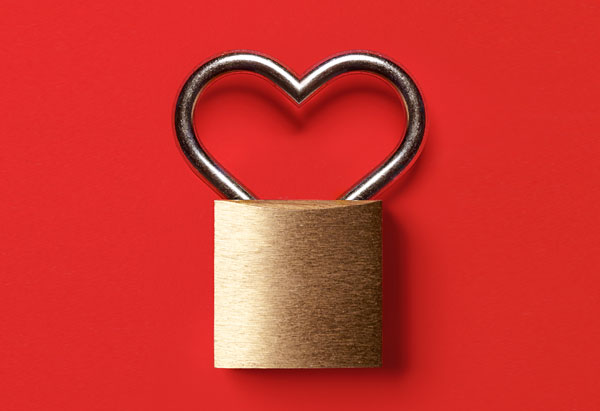Do you know how to spot a heart attack weeks before it happens? Now you will, with this at-a-glance guide.

Photo: Levi Brown
Twenty-three years ago, back when I was doing my surgical training, I chose the heart as my specialty because I believe it's the most important human organ. Beating 100,000 times per day, this master pump circulates oxygen, nutrients, hormones, and immune system cells through every square inch of our bodies. I know you've heard the lifestyle recommendations for keeping your heart in peak condition—adopt a healthy diet, exercise regularly, steer clear of cigarettes—and hopefully you're following them. But there are other, surprisingly simple things you can do to help your heart help you; in recognition of American Heart Month, here are my top five:
Turn Down the Volume
Noise pollution is a fact of life, but chronic exposure to sounds as low as 70 decibels (equivalent to normal street traffic) can raise your heart rate, blood pressure, stress level, and risk of heart attack and stroke. What's more, a long-term study analyzing the incidence of heart problems among Finnish adults found an 80 percent higher rate of death from cardiovascular disease among women who had described themselves as being sensitive to sound. So do what you can to keep things quiet, especially at night when noise seems to have the greatest impact. If you live near a high-traffic area, keep the windows closed and wear earplugs whenever possible.
Take Care of Your Teeth
Left unchecked, bacteria like P. gingivalis can grow in your mouth and get into your bloodstream, potentially damaging vessels and causing clots. But by reducing bacterial growth, preventive dental care can lessen the risk of cardiovascular trouble in women by 33 percent. Keep regular dentist appointments twice a year (on average), brush at least twice a day, floss once a day, and munch on a carrot after a meal (a great way to help scrape away plaque).
Don't Take Calcium by Itself
A 2010 study found that over time, taking this supplement alone—which can promote calcification of the arteries—may increase your heart attack risk. Instead, balance your daily calcium intake (up to 600 milligrams) with magnesium (400 milligrams) and vitamin D (1,000 IU), which help promote cardiovascular health.
Get the Flu Shot
Influenza doesn't just mean coughs and chills; the infection can cause inflammation throughout the body, including in your arteries—where it can irritate plaque, which can potentially rupture and lead to a heart attack. Studies have found that the flu vaccine can reduce the risk of heart attack by up to 50 percent; getting your shot early (between September and mid-November) increases your protection.
Stay Away from BPA
Bisphenol A (BPA) is a widely used compound found in food and beverage containers. Evidence now suggests that exposure to this chemical may increase your risk for cardiac disease, possibly by short-circuiting the cells of your heart, leading to potentially deadly arrhythmias. Minimize your exposure to BPA by limiting your use of canned foods, avoiding No. 7 plastics, and using nonplastic containers in the microwave.
Next: How can you tell if you're having a heart attack? Dr. Oz has the answers...
Turn Down the Volume
Noise pollution is a fact of life, but chronic exposure to sounds as low as 70 decibels (equivalent to normal street traffic) can raise your heart rate, blood pressure, stress level, and risk of heart attack and stroke. What's more, a long-term study analyzing the incidence of heart problems among Finnish adults found an 80 percent higher rate of death from cardiovascular disease among women who had described themselves as being sensitive to sound. So do what you can to keep things quiet, especially at night when noise seems to have the greatest impact. If you live near a high-traffic area, keep the windows closed and wear earplugs whenever possible.
Take Care of Your Teeth
Left unchecked, bacteria like P. gingivalis can grow in your mouth and get into your bloodstream, potentially damaging vessels and causing clots. But by reducing bacterial growth, preventive dental care can lessen the risk of cardiovascular trouble in women by 33 percent. Keep regular dentist appointments twice a year (on average), brush at least twice a day, floss once a day, and munch on a carrot after a meal (a great way to help scrape away plaque).
Don't Take Calcium by Itself
A 2010 study found that over time, taking this supplement alone—which can promote calcification of the arteries—may increase your heart attack risk. Instead, balance your daily calcium intake (up to 600 milligrams) with magnesium (400 milligrams) and vitamin D (1,000 IU), which help promote cardiovascular health.
Get the Flu Shot
Influenza doesn't just mean coughs and chills; the infection can cause inflammation throughout the body, including in your arteries—where it can irritate plaque, which can potentially rupture and lead to a heart attack. Studies have found that the flu vaccine can reduce the risk of heart attack by up to 50 percent; getting your shot early (between September and mid-November) increases your protection.
Stay Away from BPA
Bisphenol A (BPA) is a widely used compound found in food and beverage containers. Evidence now suggests that exposure to this chemical may increase your risk for cardiac disease, possibly by short-circuiting the cells of your heart, leading to potentially deadly arrhythmias. Minimize your exposure to BPA by limiting your use of canned foods, avoiding No. 7 plastics, and using nonplastic containers in the microwave.
Next: How can you tell if you're having a heart attack? Dr. Oz has the answers...

Photo: Ben Goldstein/Studio D
Q: How do I know whether statins are right for me?
A: In general you should probably be on a statin—a cholesterol-lowering drug that can prevent heart attack and stroke—if you suffer from coronary artery disease; have a combination of its risk factors, such as high blood pressure or a family history of high cholesterol or cardiovascular disease; or if you're diabetic, obese, or over the age of 65 (for women). If you have high cholesterol but only a few of these factors, you may not benefit from statins. In most cases, before writing a prescription, your doctor will give you six months to lower your cholesterol through lifestyle changes such as diet and exercise. Keep in mind that statins have side effects, including muscle and joint aches and diarrhea, and that you have to take them indefinitely in order to retain their benefit.
Q: What are the signs of heart attack in women?
A: Women are less likely than men to experience chest discomfort during a heart attack, and more likely to have shortness of breath, weakness or fatigue, nausea or vomiting, indigestion, dizziness, or pain in the back, neck, or jaw. In addition, women often exhibit warning signs—such as unusual tiredness and sleep disturbances—weeks to months before having a heart attack, but don't seek treatment because they don't associate these symptoms with an oncoming cardiac event. (Doctors can—and do—make the same mistake, attributing such symptoms to noncardiac causes such as anxiety or heartburn.) Protect yourself by being proactive: As soon as you suspect you're having a heart attack, call 911 and chew an aspirin, which can reduce damage to the heart muscle. At the hospital, insist that your complaints be taken seriously; you should be given an electrocardiogram or enzyme blood test.
Q: Do hormone therapies or birth control pills increase heart attack risk?
A: The answer seems to depend on your age. If you begin hormone therapy (HT) less than 10 years after the onset of menopause, or between the ages of 50 and 59, you're probably not in harm's way. Some data even suggest estrogen can protect the heart when taken early in your menopausal years. But women who wait more than 10 years after menopause to start HT, or who are over 60, are at increased risk. The general recommendation is to start HT as soon as possible after menopause begins, and to take the lowest effective dose for the shortest amount of time needed to treat symptoms (you shouldn't be on HT for more than five years, as this significantly increases your risk of breast cancer). As for birth control pills, they're generally safe for healthy women under the age of 35 who don't smoke and don't have any other risk factors for heart disease.
Next: How the heart works...and what happens when it doesn't
A: In general you should probably be on a statin—a cholesterol-lowering drug that can prevent heart attack and stroke—if you suffer from coronary artery disease; have a combination of its risk factors, such as high blood pressure or a family history of high cholesterol or cardiovascular disease; or if you're diabetic, obese, or over the age of 65 (for women). If you have high cholesterol but only a few of these factors, you may not benefit from statins. In most cases, before writing a prescription, your doctor will give you six months to lower your cholesterol through lifestyle changes such as diet and exercise. Keep in mind that statins have side effects, including muscle and joint aches and diarrhea, and that you have to take them indefinitely in order to retain their benefit.
Q: What are the signs of heart attack in women?
A: Women are less likely than men to experience chest discomfort during a heart attack, and more likely to have shortness of breath, weakness or fatigue, nausea or vomiting, indigestion, dizziness, or pain in the back, neck, or jaw. In addition, women often exhibit warning signs—such as unusual tiredness and sleep disturbances—weeks to months before having a heart attack, but don't seek treatment because they don't associate these symptoms with an oncoming cardiac event. (Doctors can—and do—make the same mistake, attributing such symptoms to noncardiac causes such as anxiety or heartburn.) Protect yourself by being proactive: As soon as you suspect you're having a heart attack, call 911 and chew an aspirin, which can reduce damage to the heart muscle. At the hospital, insist that your complaints be taken seriously; you should be given an electrocardiogram or enzyme blood test.
Q: Do hormone therapies or birth control pills increase heart attack risk?
A: The answer seems to depend on your age. If you begin hormone therapy (HT) less than 10 years after the onset of menopause, or between the ages of 50 and 59, you're probably not in harm's way. Some data even suggest estrogen can protect the heart when taken early in your menopausal years. But women who wait more than 10 years after menopause to start HT, or who are over 60, are at increased risk. The general recommendation is to start HT as soon as possible after menopause begins, and to take the lowest effective dose for the shortest amount of time needed to treat symptoms (you shouldn't be on HT for more than five years, as this significantly increases your risk of breast cancer). As for birth control pills, they're generally safe for healthy women under the age of 35 who don't smoke and don't have any other risk factors for heart disease.
Next: How the heart works...and what happens when it doesn't

Photo: Levi Brown
A one-minute refresher on how the heart works...and what happens when it doesn't.
Blood Pressure: The amount of force against the walls of your arteries, which is expressed in two numbers, ideally reading below 120/80. The first number is your systolic pressure (measured when the heart pumps); the second is your diastolic pressure (measured when the atria and ventricles are filling).Atherosclerosis: A buildup of plaque in the coronary arteries, which narrows the space through which the blood flows, causing your blood pressure to rise.
Angina pectoris: Severe chest pain, which may spread to your back, arms, and neck, caused by a temporarily insufficient blood supply to the heart. A 2010 study found that women with serious angina were three times more likely than men to develop severe coronary artery disease.
Heart attack: Also called myocardial infarction, a heart attack occurs when the buildup of plaque in the arteries blocks blood flow to part of the heart muscle, depriving it of nutrients and causing cells to die off.
Atrial or ventricular fibrillation: A condition in which the atria or ventricles become unstable and lose their ability to properly contract. Atrial fibrillation sometimes produces blood clots, which can travel to the brain and cause a stroke.
Vital Stats
36Percentage of women in the United States (totaling 42 million) who suffer from cardiovascular disease, which includes hypertension, coronary heart disease, and angina.
433,000
Number of deaths a year among American women due to cardiovascular disease (making it the leading killer of women), followed by cancer (270,000) and chronic lower respiratory disease (67,000).
15
Average number of years a normal life span is shortened by a heart attack.
More Heart-Health Tips from Dr. Oz
- 8 ways to save your ticker
- What to eat for a healthy heart
- Know when to slow down and when to speed up
- Use your head to help your heart
- 9 numbers that count when it comes to your health
- 5 warning signs you should never ignore
- Can faking happiness lead to heart disease?
- Everyone knows sodium drives up blood pressure—but which mineral lowers it?
As a reminder, always consult your doctor for medical advice and treatment before starting any program.




